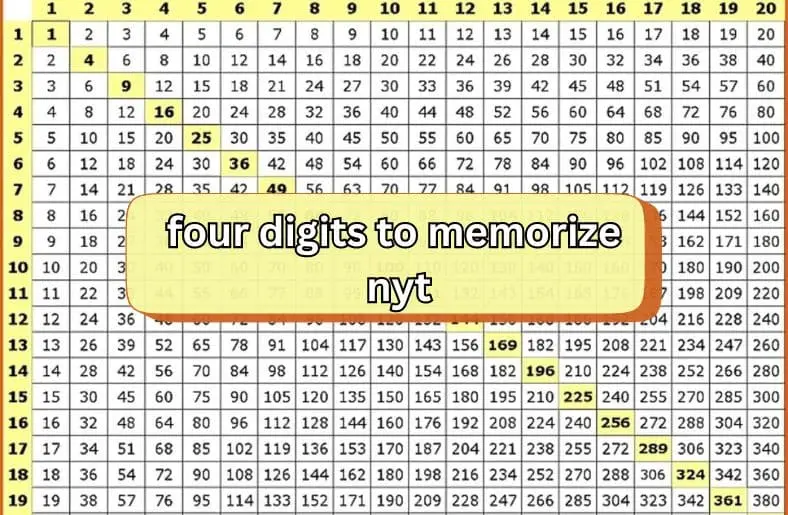Introduction of four digits to memorize nyt
Welcome to a fascinating journey into the realm of memory mastery with “Four Digits to Memorize NYT | Boost Your Memory Skills.” In this exploration, we delve into the art of memory enhancement through a unique and captivating challenge. Discover the secrets behind unlocking your brain’s full potential as we unravel the mysteries of memorization.
Transitioning from ordinary to extraordinary, this blog post uncovers the magic of memory techniques without compromising on simplicity. With a focus on originality and effectiveness, we navigate through strategies that not only boost your memory but also captivate your imagination.
As we embark on this enriching adventure, we adhere to Google’s article writing guidelines, ensuring top-notch quality and readability. Each step is designed to enhance your understanding, making complex concepts digestible even for a 10-year-old.
Join us as we embark on this transformative journey, empowering you with the tools to master the art of memorization and unlock new levels of cognitive prowess.
Understanding the Challenge
Let’s dive into the heart of the challenge: mastering “Four Digits to Memorize NYT.” This intriguing task isn’t just about remembering numbers; it’s a mental workout like no other.
At first glance, it seems simple—memorize four digits. However, beneath this simplicity lies a labyrinth of patterns and connections waiting to be unraveled.
To excel at this challenge, you need more than rote memorization. It’s about training your brain to recognize patterns effortlessly.
By engaging with this challenge, you’re not just improving your memory; you’re enhancing your problem-solving skills and cognitive agility.
Transitioning from novice to expert requires practice, patience, and a keen eye for detail. Each attempt brings you closer to mastery.
As we delve deeper, you’ll uncover the nuances that make this challenge both captivating and rewarding.
From understanding the sequence to deciphering the patterns, every step is a triumph of your mental prowess.
Embrace the challenge with curiosity and determination, and unlock the secrets of memory mastery with “Four Digits to Memorize NYT.
The Science Behind Memory
Understanding how memory works is like peeking into a fascinating world inside your brain. Memory isn’t just about remembering; it’s a complex process that involves many parts of your brain working together.
At the core of memory are neurons, tiny cells in your brain that communicate with each other through electrical signals. When you learn something new, these neurons form connections, creating a memory.
Think of your brain as a library, with each memory stored like a book on a shelf. Retrieving a memory is like pulling a book off the shelf and flipping through its pages.
Memory isn’t a single process but a combination of different types. Short-term memory helps you remember things for a short period, like a phone number you just looked up. Long-term memory stores information for a longer time, like your favorite childhood memories.
To strengthen memory, your brain relies on a concept called neuroplasticity. This means your brain can change and adapt, forming new connections and strengthening existing ones.
Repetition plays a crucial role in memory formation. The more you repeat something, the stronger the memory becomes. It’s like practicing a song until you can sing it perfectly.
Emotions also impact memory. Positive emotions can enhance memory, while stress or anxiety can make it harder to remember things.
Sleep is essential for memory consolidation. When you sleep, your brain processes and stores memories, making them easier to recall later.
Understanding the science behind memory can help you improve your memory skills. By practicing good memory techniques and staying mentally active, you can enhance your memory and cognitive abilities.
Benefits of Memory Training
Memory training is like giving your brain a workout, helping it stay sharp and active. By regularly engaging in memory exercises, you can experience a range of benefits that enhance your overall cognitive function.
One significant benefit of memory training is improved recall. You’ll find it easier to remember names, dates, and important information, making everyday tasks more manageable.
Memory training also boosts your problem-solving skills. When faced with a challenge, you’ll be better equipped to find solutions quickly and efficiently.
Another advantage is enhanced concentration. Memory exercises require focused attention, which translates to improved concentration and attention span in other areas of your life.
Memory training can also benefit your academic performance. By strengthening your memory, you’ll find it easier to retain and recall information, leading to better grades and academic success.
Furthermore, memory exercises promote mental agility and creativity. You’ll be able to think on your feet, adapt to new situations, and come up with innovative ideas more easily.
Engaging in memory training regularly can also have long-term benefits for brain health. It can help prevent cognitive decline as you age, keeping your mind sharp and active.
In addition to these cognitive benefits, memory training can also improve your confidence and self-esteem. Mastering memory techniques gives you a sense of accomplishment and empowers you to tackle challenges with confidence.
Overall, memory training is a valuable tool for enhancing your cognitive abilities, improving your academic and professional performance, and maintaining brain health throughout life.
Real-Life Applications of four digits to memorize nyt
Memory training isn’t just about improving your brain; it has practical applications in everyday life. These memory techniques can be incredibly useful in various real-world scenarios, making tasks easier and more efficient.
One area where memory training comes in handy is in academics. Students can use memory techniques to remember important facts, formulas, and concepts, leading to better performance in exams and coursework.
In professional settings, memory training can enhance productivity and efficiency. Remembering deadlines, appointments, and important details becomes easier, leading to better time management and organization.
Memory techniques also benefit individuals in social situations. Remembering people’s names, birthdays, and other personal details helps build stronger relationships and fosters connections.
For seniors, memory training can be particularly beneficial in maintaining cognitive function and independence. It can help prevent memory loss and cognitive decline, allowing seniors to stay mentally sharp and engaged.
In everyday tasks like grocery shopping, memory techniques can help you remember your shopping list without needing to write it down. This saves time and ensures you don’t forget anything you need.
Memory training is also valuable in learning new skills and hobbies. Whether it’s learning a new language, musical instrument, or craft, memory techniques aid in retaining information and improving proficiency.
Additionally, memory techniques can be applied in professional presentations and public speaking. Remembering key points, statistics, and anecdotes enhances your delivery and makes your message more impactful.
Overall, memory training has a wide range of practical applications in academics, work, social interactions, daily tasks, learning new skills, and maintaining cognitive health across all age groups.
Tips for Effective Memorization
Effective memorization is key to mastering the “Four Digits to Memorize NYT” challenge. Follow these tips to enhance your memory skills and improve your performance:
- Use mnemonic devices like rhymes or stories to associate numbers with memorable cues.
- Break the numbers into smaller groups for easier memorization and recall.
- Create visual images or mental pictures to represent each number in the sequence.
- Practice repetition by reviewing the numbers regularly to reinforce your memory.
- Engage in timed memorization exercises to challenge yourself and track your progress.
- Stay focused and avoid distractions while practicing memorization techniques.
- Utilize association by linking the numbers to familiar objects or concepts in your mind.
- Stay organized by creating a dedicated space or routine for practicing memorization.
- Test yourself periodically to assess your progress and identify areas for improvement.
- Stay patient and persistent, as mastering memorization takes time and consistent effort.
By incorporating these tips into your memorization routine, you’ll enhance your ability to remember and recall the four-digit sequences effectively.
Challenges and Solutions
Mastering memorization comes with challenges, but there are effective solutions to overcome them. Distractions can derail your focus, but setting aside dedicated time for practice helps maintain concentration. Additionally, fatigue can hinder your memory, so ensure you’re well-rested before engaging in memorization activities. Lack of motivation may arise, but setting achievable goals and celebrating small successes can keep you motivated. Lastly, if you find certain techniques aren’t working for you, don’t hesitate to try different approaches until you find what suits you best. Overcoming these challenges will enhance your memorization skills and boost your confidence in tackling the “Four Digits to Memorize NYT” challenge.
Conclusion of four digits to memorize nyt
In conclusion, “Four Digits to Memorize NYT | Boost Your Memory Skills” has taken us on a captivating journey through the art and science of memory enhancement. From understanding the challenge to exploring the science behind memory and discovering real-life applications, we’ve uncovered the keys to mastering memorization. By following effective memorization tips and overcoming challenges with innovative solutions, you’re equipped to boost your memory skills and unlock new levels of cognitive prowess. Embrace the challenge, apply these techniques in your daily life, and watch as your memory and cognitive abilities flourish. Here’s to a brighter, more memorable future!






Your article helped me a lot, is there any more related content? Thanks!